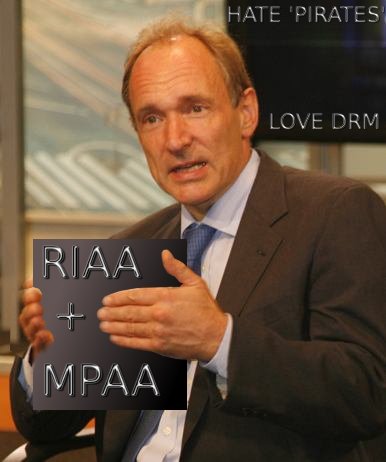

Source: Original from John S. and James L. Knight Foundation, modified by Techrights
Tim Berners-Lee is quickly losing credibility and he has nobody else to blame. He actively echoes Hollywood talking points or at least Hollywood's apologists, to whom a copyright monopoly or cartel is perfectly acceptable if not essential.
Mozilla’s Shumway project, an attempt to create a replacement Flash plug-in that uses HTML5, might ever so slightly placate those barracking for the latter. Previously Shumway has only been available as a separate extension, but it recently made its way into Firefox’s nightly builds, hinting at the prospect of mainline inclusion somewhere down the line.
Tim Berners-Lee on Why HTML5 "Needs" DRM
[...]
That's an extremely odd comment, since it divides up the online world up into active creators and passive consumers. That's precisely the framing that the copyright industry adopts in an attempt to minimise the rights of Internet users, and to belittle their role.
[...]
Putting users first is great, but this sets up a false dichotomy between those who "like to watch big-budget movies at home" and those who want an open Web, as if the former must lose if the latter win. But it's ridiculous to suggest that companies like Netflix will stop streaming video over the Internet if the Web does not include DRM. It may do it with proprietary Web plugins, or it might even insist that people use standalone code, but that's not a problem - it is exactly how it's been done in the past.
Moreover, the open Web will exist and thrive even if some people choose to use proprietary code, just as open source thrives despite the existence of some closed-source applications. The only people who might conceivably lose out if DRM isn't included in HTML is the W3C, who won't be able to control exactly how those non-Web parts operate. But that's true now, anyway, and I can't believe that the W3C is so power crazed that it wants to sacrifice the open Web solely to extend its empire a little further.
Comments
Michael
2013-10-16 04:03:31
Why not have a built in standard and not a bunch of plugins people need to download?
XFaCE
2013-10-17 19:17:31
Indeed, and while we're at it, why not breed unicrons and fairies for everyone.
Hey Michael, you realize that this "plugin-free" solution still depends on what are essentially proprietary plugins ("Content Decryption Modules") right? Please explain to me how this solves the problems of relying on proprietary extensions.
>So what is your solution? How do individuals and companies protect their IP?
Well that depends. What exactly are we protecting? Protecting from whom? What is IP in a practical sense? What about studies that show positive effects from file sharing that's violating "protection" as you put it? Why do we need law-based and tech-based solutions? Why are tech-based solutions protected under law? What is the evidence of a broad negative effect?
But maybe I'm too nuanced here. I should instead follow your example and use loaded questions to paint the world in black and white. "How do good honest citizens protect themselves from that stupid idiot troll Michael harassing them on the Internet?" See, I can do it too.
Michael
2013-10-17 19:50:59
XFaCE
2013-10-17 19:20:56
Michael
2013-10-17 19:52:29
XFaCE
2013-10-17 22:40:01
Michael
2013-10-17 23:27:01
I am merely noting that whining about standards without having a good alternative is not good. Roy and those who are against standards should come up with a *solution* (even if just in idea form - I am not saying they must implement it), not just whine about the solutions are others are coming up with.
I am pushing for freedom and for people to go with any shade of gray they want. I am fighting against the idea that any ideas but mine must be bad. That is what Stallman pushes and what Roy repeats - use their ideas or it is immoral. No: Stallman's GPL is a great license, but it should be a *choice*. People should be free to protect their own property in multiple ways.
Having standards for HTML and CSS and image formats and video formats and audio formats and networking formats and IP protection all make sense (and many have already been implemented), but people should not be forced to use them and there should be freedom to improve on them and offer updated ideas that can become new standards. Nothing black and white about that at all.
Calling this "black and white" thinking without being able to explain how or why merely shows a lack of understanding on your part. You seem to have a strong desire to disagree but no real content to use with your disagreement. Add to that your silly insults, accusations, and engagement in name calling only serves to make you look lost and immature. Please try to raise the level of your discourse.
Thank you.